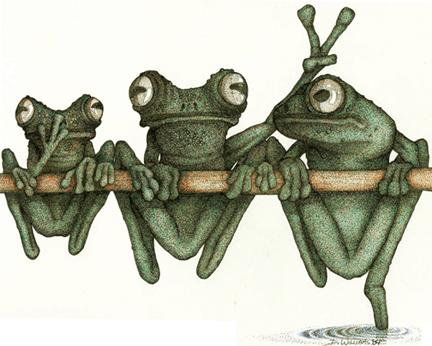Today is Wednesday and that means getting up extra early so I can have time to prepare breakfast for my wise friend and teacher. I hope Dharma can help me with my problem. I don't want to lose my friend over this and I desperately need some sleep. While the sun was just being to peak over the horizon, Dharma hopped onto my lily pad. He was in a jovial mood, as always, and he could see I wasn't yet fully awake. After we exchanged the minimal "Good morning," we sat down to a simple repast. Dharma knew I was tired and upset so without much preliminary chatter, he asked what was troubling me. I told him my horrible tale and the even worse night. I sat, rather dejectedly, waiting for his pearls of wisdom to pour forth. I didn't have to wait long. "Tadpole, the frog who flees at the right time can fight again. We've all be caught up in fighting a losing battle. Knowing when to cut your losses and move away when tensions escalate can prove to be a very valuable tool to have. Not only do we fight the battle with someone else, we then fight it all over again with ourselves. That endless 'would have, could have, should' have mental conversation we have with ourselves at three in the morning, only makes the situation worse. And it is the toughest battle of all for us to hop away from with our dignity still intact."
Dharma was right. I was beating myself up pretty good. I was bloodied and battered. I can go and apologize to my friend and hope he forgives me, but how am I supposed to get past the demoralizing chatter in my head? What follows is Dharma's insightful suggestions.
When you find yourself in a losing battle, whether it's with another person, or staying too long in dead-end job or relationship, or even working on a project long after it's become abundantly clear its too big for us to ever finish, most of us hate to admit defeat and throw in the towel. But failure to do so can mean a loss of other opportunities and even a loss of happiness. Dharma says the biggest reason why we all do this is what he calls the "sunk costs." Sunk costs are the resources that you've put into an endeavor that you can't get back out; time (sometimes it years) or money wasted that could have been used elsewhere. "Putting in a lot only to end up with nothing to show for it is just too awful for most of us to seriously consider. We worry far too much about what we'll lose if we just move on, and not nearly enough about the costs of not moving on - more wasted time and effort, more unhappiness, and more missed opportunities. So how can we make it easier to know when to cut our losses and live to fight another day?
Dharma suggests that we learn to focus on what you have to gain, not on what you have to lose. You might call this promotion focus. When we think about our goals in terms of potential gains, we automatically (often without realizing it) become more comfortable with making mistakes and accepting the losses we may have to incur along the way. Prevention focus, on the other hand, puts all the attention on what we have to lose. We think about our goals in terms of what we could lose if we don't succeed, we become much more sensitive to sunk costs.
The next step is kindness and self-compassion. Why is it we can forgive ours but we have such a hard time forgiving ourselves? We all do this. We expect far more from ourselves than we do from others. We say things to ourselves that we would never dream of uttering to someone else. We call ourselves stupid. We tell ourselves that we're unworthy somehow and that we deserve whatever horribleness happens to us. Our mental battles at three in the morning are proof that we don't treat ourselves with love and respect. Most of us would never call up our boss at that hour and start berating him or her, would we? Yet we do it to ourselves all the time. It's not easy reversing years of this behavior, but it can be done, often with baby steps. if you wouldn't say something to another, don't say it to yourself. Forgive and learn from the mistake, then move on. Making ourselves the whipping boy helps no one.
The final step can be the easiest; learn which battles are worth fighting and which ones aren't. We each know what is most important to us. The people, causes, and projects that we know are battles worthy of us are the ones we fight. All the rest? Walk away from. Even with those we deem as necessary, it is still important to know when enough is enough. Learning when to "hold 'em and when to fold 'em" isn't just great advice for playing poker. It works well for life, too.
After Dharma left, I let his message digest in my brain. I felt quite a bit better and, after calling my friend to apologize, I apologized to myself. It wasn't easy to do. But, Dharma assured, it does get easier with practice. Maybe I'm not such a terrible frog after all.
Now, I think it's time for a well-earned nap.
I invite you back here tomorrow for a look at immortality and the lessons we can learn from a very odd-looking creature. Until then, I wish you
PEACE.

 RSS Feed
RSS Feed